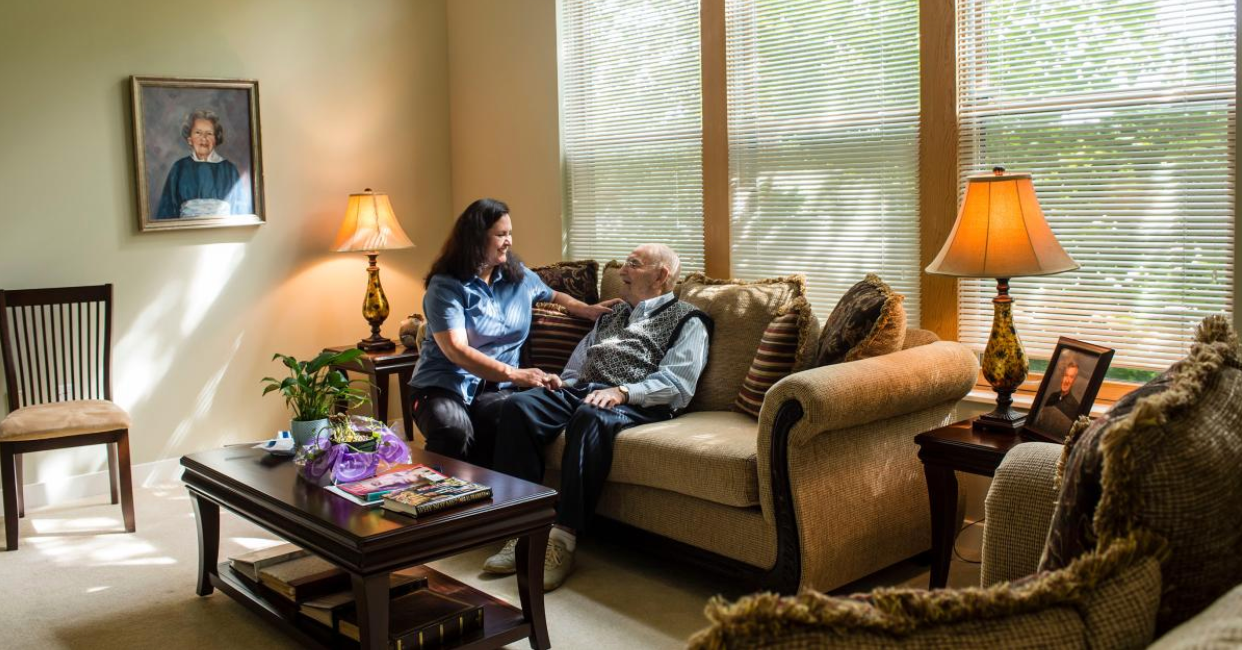Macular Degeneration: Causes, Symptoms, and Home Care Solutions
According to Johns Hopkins Medicine, risk factors for Age-Related Macular Degeneration include being 50 and older, smoking, having high blood pressure and eating a diet high in saturated fat.
Macular degeneration is a prevalent eye condition that affects millions of people around the world, including those in the New York metropolitan area, including Manhattan, Queens, Brooklyn, Nassau County, and Suffolk County. As a leading provider of home care services in New York, 7 Day Home Care is committed to raising awareness about macular degeneration, its impact, and the importance of early detection and care.
In this article, we will discuss its causes, symptoms, risk factors, and the role of home care in managing this condition. We will also provide valuable statistics to lend a greater perspective on the prevalence and significance of macular degeneration in our communities.
What is Macular Degeneration?
Macular degeneration, also known as age-related macular degeneration (AMD), is a progressive eye disease that primarily affects older adults. It damages the macula, a small but crucial part of the retina responsible for central vision. The macula enables us to see fine details and perform essential tasks like reading, recognizing faces, and driving.
Prevalence of Macular Degeneration
Macular degeneration is a widespread condition in the United States, and its prevalence is expected to increase as the population ages. Here are some key statistics:
- According to the National Eye Institute (NEI), approximately 11 million people in the U.S. have some form of AMD, making it the leading cause of vision loss in individuals aged 50 and older.
- The prevalence of AMD is expected to reach nearly 22 million by 2050 due to the aging population, as reported by the American Academy of Ophthalmology (AAO).
These statistics highlight the importance of understanding AMD and its potential impact on individuals and communities, including those served by 7 Day Home Care.
Types and Causes of Macular Degeneration
There are two main types of macular degeneration: dry AMD and wet AMD. Understanding the differences between these types and their causes is essential for effective management.
- Dry Macular Degeneration
Dry AMD is the more common form of the disease, accounting for about 90% of cases. It develops when the macula thins and breaks down over time, leading to vision loss. The exact cause of dry AMD is still under study, but it is believed to involve a combination of genetic and environmental factors.
- Wet Macular Degeneration
Wet AMD, although less common, is more severe and can cause rapid and severe vision loss. It occurs when abnormal blood vessels grow beneath the retina and leak blood and fluid into the macula. This leakage damages the macula and can lead to distorted or blurry vision. Wet AMD is often considered more challenging to manage.
Risk Factors
Certain risk factors increase an individual's likelihood of developing macular degeneration. Some of these include:
- Age: As the name suggests, AMD is age-related, with the risk increasing significantly after the age of 50.
- Family history: A family history of AMD can increase the risk.
- Smoking: Smoking has been identified as a significant modifiable risk factor for AMD.
- Race and ethnicity: Caucasians are at a higher risk of AMD than African Americans and Hispanics.
- Obesity: Being overweight or obese can increase the risk of developing AMD.
- Cardiovascular disease: Conditions like high blood pressure and high cholesterol are associated with a higher risk of AMD.
Prominent Statistics on Risk Factors
Let's take a closer look at some key statistics related to the risk factors for macular degeneration:
- The American Academy of Ophthalmology reports that the risk of AMD increases with age, affecting an estimated 14% of those aged 85 and older.
- A study published in JAMA Ophthalmology found that smoking is associated with a two-fold increased risk of developing AMD.
- According to the National Eye Institute, individuals with a family history of AMD are at a higher risk, with a fourfold increased likelihood of developing the condition.
- Obesity has also been linked to AMD, with a study published in JAMA Ophthalmology revealing that obese individuals have a 44% higher risk of developing early AMD compared to those with a healthy weight.
These statistics underscore the importance of addressing modifiable risk factors, such as smoking and obesity, through lifestyle changes and interventions to reduce the risk of developing macular degeneration.
Symptoms of Macular Degeneration
Recognizing the early signs and symptoms of macular degeneration is crucial for early diagnosis and intervention. Both dry and wet AMD may present with different symptoms.
Symptoms of Dry Macular Degeneration
Dry AMD typically progresses slowly, and its symptoms may include:
- Blurred or fuzzy central vision.
- Difficulty recognizing faces.
- Reduced ability to read or perform tasks that require fine detail.
- Increased sensitivity to light and glare.
- Need for brighter light when reading or performing close-up tasks.
Symptoms of Wet Macular Degeneration
Wet AMD can lead to more sudden and severe symptoms, including:
- Distorted or wavy central vision.
- Dark spots or blank areas in the central field of vision.
- Rapid loss of central vision.
- Visual hallucinations (rare).
Prompt recognition of these symptoms is essential for timely medical intervention, which can help slow down the progression of the disease.
Diagnosis and Treatment
Early diagnosis and appropriate treatment are vital in managing macular degeneration. Regular eye exams by an ophthalmologist are essential for early detection.
Diagnosis
Diagnosing AMD typically involves the following:
- A comprehensive eye exam: This includes a dilated eye examination, visual acuity tests, and imaging tests such as optical coherence tomography (OCT) and fluorescein angiography.
- Amsler grid test: A simple at-home test that helps individuals monitor changes in their central vision.
Treatment
While there is no cure for macular degeneration, several treatment options are available to manage the condition and preserve vision:
- There may be medications available through your doctor or health care professional which can slow the growth of abnormal blood vessels in wet AMD and reduce leakage.
- Laser therapy: Laser treatment can sometimes be used to destroy abnormal blood vessels.
- Low vision aids: Devices like magnifiers and electronic reading machines can help individuals with AMD make the most of their remaining vision.
The choice of treatment depends on the type and severity of macular degeneration and should be discussed with a qualified eye care specialist. The information provided in this article on macular degeneration is intended for educational purposes only. It is not a substitute for professional medical advice, diagnosis, or treatment. Always seek the advice of your physician or other qualified healthcare provider with any questions you may have regarding a medical condition. Never disregard professional medical advice or delay in seeking it because of information contained in this article.
The Role of Home Care in Macular Degeneration Management
7 Day Home Care understands the unique challenges that individuals with macular degeneration face. Our home care services in Manhattan, Queens, Brooklyn, Nassau County, and Suffolk County, New York, are designed to provide comprehensive support and assistance to those dealing with this condition.
Vision Assistance
Our caregivers are trained to provide vision assistance, such as reading labels, helping with medication reminders, assistance with safe ambulation, and providing accompaniment to medical appointments. They can also assist with meal preparation and ensure that individuals with AMD receive a balanced diet rich in eye-healthy nutrients like vitamins A, C, and E, as well as zinc and omega-3 fatty acids.
Emotional Support
Macular degeneration can be emotionally challenging, as it may impact an individual's independence and quality of life. Our caregivers are compassionate and understanding, providing emotional support to help clients cope with the emotional aspects of vision loss.
Home Modifications
We can assist in making necessary home modifications to create a safer and more accessible environment for individuals with macular degeneration. This may include adjusting lighting, eliminating tripping hazards, and ensuring that essential items are easily accessible.
Transportation Assistance
Accompaniment to medical appointments, support groups, and social activities is vital for individuals with macular degeneration. Our caregivers can accompany clients to ensure their safety and well-being.
Macular degeneration is a common and potentially debilitating eye condition that affects a significant portion of the population, including communities in Manhattan, Queens, Brooklyn, Nassau County, and Suffolk County, New York. It is essential to raise awareness about the disease, its risk factors, and the importance of early detection and management.
7 Day Home Care is committed to providing comprehensive home care services tailored to the unique needs of individuals with macular degeneration. By offering vision assistance, emotional support, home modifications, and transportation assistance, we aim to enhance the quality of life for our clients and help them maintain their independence.
Remember that regular eye exams, a healthy lifestyle, and early intervention are key factors in managing macular degeneration effectively. By working together with healthcare professionals and home care providers like 7 Day Home Care, we can make a significant difference in the lives of those affected by this condition and ensure they receive the support they need to thrive.
Brian Callahan
7 Day Home Care










